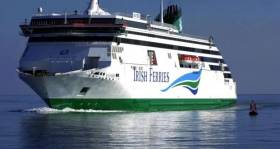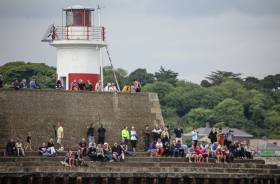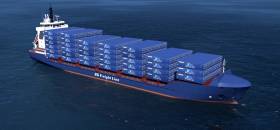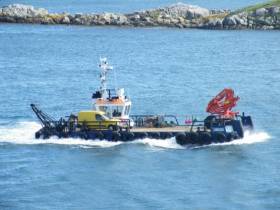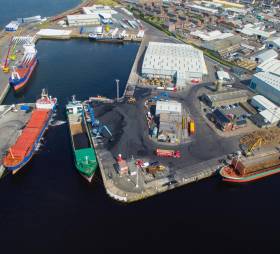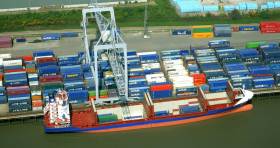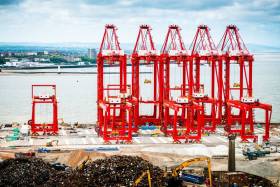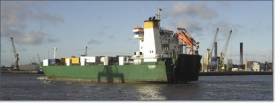Displaying items by tag: Ports & Shipping news
ICG Sees Bookings in Tourism Recover after Brexit Wobble
#HalfYearResults - Container and ferry operator, Irish Continental Group said the Brexit vote “shock” had a brief impact on tourism bookings. But they have since recovered as the ferry operator reported a 19.6 per cent increase in earnings for the first half, writes The Irish Times.
Earnings before interest, tax, depreciation and amortisation (ebitda) rose to €30.5 million from €25.5 million for the same period last year. Cars carried on its division, Irish Ferries increased 5.5 per cent and roll-on, roll-off (RoRo) freight volumes gained 5.6 per cent.
Container (LoLo) volumes shipped during the period rose by 7.4 per cent, it said.
The result of the June Brexit referendum “had an initial negative impact on UK consumer demand”, said ICG. “The demand situation seems to have settled now as the initial shock of the referendum result has waned, although the negative sterling impact on yields remains.”
ICG said the outlook for the remainder of the year “is for a continuation of the overall business momentum seen to date, with some easing in our tourism revenues, growth in our RoRo and LoLo (lift-on, lift-off) revenue, and increased contribution” from chartering ships to third parties.
Total revenues rose by 5.2 per cent on the year to €150 million, while basic earnings per share increased 32 per cent to 10.3 cents. ICG will pay out a 3.82 cent dividend for the first half, up 5 per cent on its last interim dividend.
For more on the half-year results, click here.
Wicklow Port Transferred to Wicklow County Council
#PortTransfer - Minister for Transport, Tourism and Sport Shane Ross T.D. has signed an Order transferring Wicklow Port Company to Wicklow County Council, with the consent of his colleagues Paschal Donohoe T. D., Minister for Public Expenditure and Reform and Simon Coveney T.D. Minister for Housing, Planning, Community and Local Government.
Wicklow Port is the first port to transfer under National Ports Policy which was approved by Government and published in 2013. The policy recommended that designated Ports of Regional Significance - Drogheda, Dún Laoghaire, Galway, New Ross and Wicklow - transfer to more appropriate local authority led governance structures.
These ports are important to their regional economy and the transfers support the Government’s reforms in the area of local government generally, through enhancing the role of the local authority in regional economic development. Ports of Regional Significance retain important regional roles as freight distribution hubs and also increasingly important roles in areas such as marine leisure and tourism. The Harbours Act 2015 provides the legislative basis for the transfers to proceed.
Speaking today Minister Ross welcomed the transfer and said:
“Today marks an important milestone as Wicklow Port is the first Port of Regional Significance to transfer to a local authority. Wicklow Port is a thriving regional commercial port and the transfer will provide new opportunities for the development of marine-related activities and regional freight, and to further develop marine leisure and tourism, cultural and recreation amenities in the area, offering significant potential for local employment creation.
I wish to commend the work undertaken by the Chief Executive and his staff in Wicklow County Council as well as the work undertaken by the Board and staff of Wicklow Port who have actively engaged in the due diligence process over a number of months in preparation for transfer.
As you are aware our commercial ports are vital to our future economic growth. They are the gateways for most of our merchandise trade, and for significant numbers of tourists and passengers. National ports policy encourages every port to develop its full potential to ensure that each port can contribute to growth in the overall sector. Ports of Regional significance serve a niche market and provide an important regional and local function.”
New 'Ireland' Max Containerships for BG Freight Line
#NewContainerships - Container operator, BG Freight Line, a subsidiary of UK based Peel Ports Group, is to receive new tailor-made short-sea 'feeder' containerships optimised for the company’s Irish Sea Hub services.
The new class of ‘green’ vessels has been developed by BG Freight Line operation with ARKON Shipping as project initiator/commercial manager, technical managers Jüngerhans Maritime Services, and designers CIMC ORIC.
BG Freight Line will take delivery of four sister vessels under long-term charter after delivery from Zhoushan Changhong International Shipyard, with them expected to enter service during 2018.
The vessels will be built to DNV GL standards and will be fitted with state-of-the-art features in order to comply with Emission Control Area (ECA) requirements and BG Freight Line’s navigation and trading needs.
They will be fitted with a modern wet scrubber system for exhaust cleaning in order to fulfil the requirements for trading within the ECA area. The vessels are also fully fitted for the loading of 45ft short-sea containers in all positions, with room in total for 488 units.
Additionally, a various number of odd-sized containers can be stowed fast and securely due to a new proprietary and innovative cargo stowage system. To minimise operational cost the vessel will be fitted with a modern two-stroke main engine with very low fuel consumption.
All parameters of the vessels have been optimised for the trade between the North Continent, Ireland and the UK.
Koert Luitwieler, Shipping Director at BG Freight Line said: “As well as helping us, and our customers, to reduce their carbon emissions and costs, these custom vessels have a number of innovations to help keep us at the forefront of feeder services in the Irish Sea. We are looking forward to seeing them in service very soon.”
Ole Gabs, Director of ARKON Shipping said: “We are proud to have developed and managed this project under the current difficult shipping market conditions. We believe that the future for vessel design and construction is to have close partnerships between owners and charterers, especially where there is as ambition to meet the highest environmental standards.”
New 'Ireland' Max Ship Specifications
Container capacity: 1004 TEU, alternative 488 units 45ft
Deadweight: 13,250 tonnes on 8.0m draft
Length overall: 153m
Reefer plugs: 253
Service Speed: 16 knots
Exhaust cleaning by WET-scrubber
Work on MultiCat Completed at Donegal Boatyard
#Boatyard - Multicat workboat, Sgt Pepper which carries out marine coastal project work was among the recent clients of Mooney Boats, Killybegs, Co. Donegal, writes Jehan Ashmore.
The workboat earlier this year was involved in an RNLI related project in Dun Laoghaire Harbour and from where also work began to remove the former Stena HSS berth.
The facility (see: tug overhaul) has a synchrolift / building hall, where the self-propelled barge-craft was hoisted to enable a comprehensive work programme begin. This saw rudders removed from the workboat operated by McMullan Marine Services, at the boatbuilder, repair and maintenance yard that mostly caters for fishing trawlers.
Also involving Sgt Pepper, were the removal of propeller shafts and cutlass bearings. New cutlass bearing were supplied and fitted as where tappers and keys machined on the propeller shafts.
The opportunity also included installation of couplings manufactured, supplied and fitted and all machinery was given a refit before the craft was lowered back into the harbour.
#BusiestDay - On the Firth of Clyde, Scotland is ABP’s Port of Ayr which has recorded one of its busiest days in the last 25 years, with five vessels calling at the port last week.
Overall, it was one of the busiest weeks in Ayr in a generation, with 10 vessels calling at the port last Thursday- four of those for renewable energy projects. The last time the port saw this level of activity was when 1.1 million tonnes of open cast coal was exported through Ayr in 1991.
The UK energy industry currently is transitioning to renewable energy sources, and the boost in ship numbers reflects the growing demand to serve wind farm projects underway in the south-west of Scotland.
Thursday’s record day saw the port become a hub of activity with five ships calling in Ayr, each accommodating different cargoes such as onshore wind turbine components, coal exports and timber discharge.
Below are the following vessels involved in wind turbine components delivered for three separate renewable energy projects:
• The MV Abis Bergen and MV Fehn Pollux delivered wind turbine blades for the Brockloch Rig wind farms;
• The MV Arctic Rock arrived with wind turbine blades for the Dersalloch wind farm; and
• The MV Dragonera delivered tower sections and the nacelle for the Minnygap wind farm.
Port Manager for Ayr and Troon Stuart Cresswell said: “Along with our traditional agribulk and mineral business, the wind turbine contracts we have secured this year have provided a fantastic boost to the port and all our local supporting contractors and suppliers.”
ABP Short Sea Ports Director Andrew Harston said: “Following our success in supporting additional cruise calls this year, we are now actively supporting the development of more renewable power in south-west Scotland.”
“The location of ABP’s Ayrshire ports places them in close proximity to these onshore wind farms. The Ports of Ayr and Troon (see: closure confirmed of Larne, Northern Ireland ferry service) are equipped and ready to work with renewable energy companies to serve their projects.”
“This has been a strong period for our two Scottish ports. ABP is continually investing in the ports to underpin the important regional role they fulfil in serving the needs of the Ayrshire region and the west coast of Scotland.”
Across the Associated British Ports Group, ABP has over 30 years’ experience serving the UK onshore and offshore renewable energy industry.
The ports group have been involved in a range of renewable energy projects across Britain including: the Walney Extension wind farm development off Barrow-in-Furness (see recent largest cruiseship call) Galloper wind farm project serviced from ABP Port of Lowestoft and the Green Port Hull development with Siemens in the Humber.
Shipping Review: Ex US Army Craft Assists Aran Islands, New UK Minister Visits Liverpool2 & More
#ShippingReview - Jehan Ashmore reviews the shipping scene from recent weeks.
The cargsoship that transported generators to restore electricity supply to two of the Aran Islands, Afloat has identified as a former US Army landing craft vessel, MV Chateau-Thierry, which operates a roll on / roll-off freight service to and from Rossaveel, Co. Galway.
The UK Government's new Transport Minister visited Peel Ports £400m Liverpool2 deep-water container terminal development, which will enhance services to and from Ireland with onward global connections.
Arklow Beacon assisted in ABP's Port of Ipswich in the UK to achieve a record one million tonnes of grain in the 2015/16 harvest year, a new total for the Essex port and its customers.
European shipping and logistics operator, DFDS Group, raised its outlook for 2016, as second quarter freight volumes were up 33%. In the UK & Ireland alone, DFDS Logistics units in Q2 increased by 43.2% compared to 2015
DFDS Group Raises Outlook after Strong Q2
#DFDSgroup - European shipping and logistics operator, DFDS Group, writes LloydsLoadingList.com has raised its outlook for 2016 after a strong performance in the second quarter in which its freight volumes were up 33%. The increase is thanks to its much-expanded English Channel ferry capacity and 9% growth in other parts of its network.
The expanded ferry capacity in the Channel business unit supported 63% higher freight volumes and 23% more passengers, while freight volumes were up by 9% in all other parts of the network. “The Logistics Division achieved strong earnings growth through higher volumes and efficiency in both trailer operations and contract logistics,” the Copenhagen-headquartered group said.
Revenue for the three months to 30 June increased by 7%, year on year, excluding revenue from bunker surcharges, while reported revenue increased by 4% to DKK 3.6 billion (US$548 million). EBITDA operating profits before special items increased by 27% to DKK 699m following higher earnings in both the Shipping and Logistics divisions.
As for the UK & Ireland, DFDS Logistics (container services including out of Belfast, Dublin, Cork and Port of Waterford) business, the number of transported units in Q2 increased by 43.2% compared to 2015 mainly driven by new contract logistics activities for cold stores in England.Since the commencement of the contract for one cold store in Q4 2015, a further two cold stores were added during Q1 2016.
Volumes were reduced by optimisation of traffic between N. Ireland and England and the Continent as well as lower temperature controlled and steel volumes in the UK. EBIT decreased by 9% to DKK 15m mainly due to the impact of lower temperature controlled and steel volumes as well as the loss of a logistics contract for a food manufacturer in 2015. The result was, moreover, negatively impacted by the depreciation of the British pound.
For much more about the DFDS Group's performance across the Benelux, North Sea and Baltic regions, click here.
Beacon Brings Bumper Harvest For UK Port’s Record
#HarvestCargo - The UK’s number one grain exporting port, ABP's Port of Ipswich, has handled more than one million tonnes of grain in the 2015/16 harvest year, a record total for the port and its customers.
In the last 12 months 750 ships (including Arklow Beacon) have called to Associated British Ports /ABP Port of Ipswich, thats a 17% increase from the previous harvest year. The Arklow Beacon which made her maiden call to Dublin last year has a total grain capacity of 9902,6m³
Such grain cargoes are the 'bread and butter' of Arklow Shipping whose 'B' class cargoship was completed in 2014 at Ferus Smit's Dutch yard that launched the first of 10 newbuilds, Arklow Cadet in June this year.
In the last harvest year, which ended on 30 June 2015, approximately 1,093,481 tonnes of grain were handled trhough Ipswich, surpassing the previous best year in 2009/10 where 933,000 tonnes passed through the port. It’s also a third increase on last year’s total of 822,448.
In the first half of 2016 alone, 563,760 tonnes of grain were exported from the Port of Ipswich - an increase from the first half of 2015 which saw 368,795 tonnes exported.
ABP Short Sea Ports Director, Andrew Harston said: “The tonnage of grain we have seen handled at the Port of Ipswich in the recent harvest year signifies the importance of the East Anglian farming community.
“Britain has always had a strong role in exporting grains such as wheat to the rest of Europe. But following a steady grain season and the recent decline in the value of sterling, the export of wheat and other grain commodities has never been more competitive.
“Our customers Nidera and Clarkson Port Services, who operate the Ipswich Grain Terminal and Sentinel Terminal respectively, have seen tremendous results this year and we look forward to working with them to ensure further success in the 2016/17 year.”
UK Transport Minister Visits £400m Liverpool2 Development
#UKtransportMinister - The UK Government's new Sectary of State for Transport met with operators Peel Ports to view the latest developments at the £400m Liverpool2 investment in the city’s deep-water container terminal.
The MP Chris Grayling, visited the Port of Liverpool earlier this month to view the developments at its new container terminal, Liverpool2 as previously reported on Afloat.ie where giant gantry cranes arrived by ship from China.
The visit provided an opportunity for the Minister to view progress on the project, which started handling its first containers last month as part of trials ahead of a phased opening throughout the summer. The Liverpool2 project forms part of a wider £750 million investment programme into biomass, steel, port-centric warehousing and infrastructure by Peel Ports at its sites in Liverpool and along the Manchester Ship Canal.
The Minister met Peel Ports’ Chief Executive Mark Whitworth to discuss the importance of investment in the north and issues on transport integration and infrastructure improvements to improve freight connectivity between the port and major logistics centres. Once completed, the port giant’s developments will create jobs and contribute to the rebalancing of the UK economy.
Rise in Roll-On Roll-Off Traffic from Ireland to UK
#RoRoUp - In the first 7 months of 2016, roll-on roll-off (ro-ro) traffic from Dublin Port to the UK reached 462,802 freight units up 7.1%.
Traffic totals through Rosslare Harbour to the UK reached 59,421 units up 3.9%.
The figures according to UK Based IRN Research, also concluded the combined total for all Northern Irish ports, Larne, Belfast and Warrenpoint, however was slightly lower with 460,510 units up 3.5%
Afloat adds that the ro-ro sector involves the following operators: Irish Ferries, P&O Ferries, Seatruck Ferries and Stena Line. Combined these four operators provide 12 services across 10 routes.
Irish Ferries, however do not operate out of Northern Ireland. Parent company, ICG through container division EUCON have load-on load-off (lo-lo) operations using Belfast Port on 'feeder' container services to mainland Europe.


























